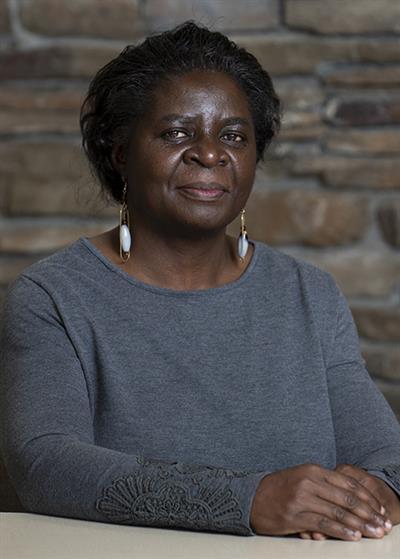-
About
- Leadership & Faculty
- News & Events
-
Academics
- Graduate
- Advanced Clinical Training
- Continuing Education
-
Student Life
-
Research
-
Hospitals & Clinics
- Emergency Care
- Hospital Services
-
Community Outreach
- Volunteer

J. Hellen Amuguni
B.V.M., M.A., Ph.D.

Research/Areas of Interest
My past and present research interests are aligned with One Health, gender and emerging pandemics threats. In the past, through my PhD and immediately after, I worked to develop low-cost non-invasive models for immunization(oral and sublingual). On engagement with the USAID/EPT project, most of my interests are in supporting countries to build capacity to be able to prevent, detect and respond to emerging pandemics. These are accomplished through working with faculty, students and in-service personnel in Africa to offer short courses on outbreak investigation and response, develop continuous professional development courses for in service personnel as well as train students to be field ready. My current research interests are aligned with the Emerging Pandemics Threat program and include finding best methods to integrate One Health into community-based project, developing integrated surveillance programs for Infectious diseases of zoonotic origin, and analyzing social, cultural and gender-related issues as they apply to global health and infectious diseases management.
Education
- Doctor of Philosophy, Tufts-Cummings School of VM, USA, 2011
- Master of Arts, Clark University, USA, 1999
- Doctor of Vet Medicine, Univ Of Nairobi, KEN, 1988
Biography
Dr. Hellen Amuguni is an Associate Professor in the Department of Infectious Disease and Global Health at the Cummings School of Veterinary Medicine, Tufts University, Massachusetts, USA with a dual appointment at the School of Medicine, Department of Public Health and Community Medicine. She has expertise in Infectious Disease, Gender and One Health. She works at the cutting edge of the One Health initiative, which combines a multidisciplinary approach and human, animal and environmental health knowledge for monitoring and prevention of current and emerging infectious diseases and integrates gender components into her work as part of her approach in strengthening collaboration and capacities of the sectors and actors involved in health service delivery.
She is the Project Director for the Tufts led USAID funded Strategies To Prevent Spillover (STOP Spillover) One Health grant- that supports six countries in Africa and Asia to stop spillover of infectious diseases from wildlife to humans, as well as reduce amplification and spread in the human population. She was also the Project Lead for the recently concluded SheVax+, a four-year IDRC funded Gender and Livestock Vaccine Innovation grant that focused on strengthening women's agency, empowerment and engagement in the livestock vaccine value chain in Kenya, Uganda and Rwanda. For eight years (until January 2020), Dr. Amuguni was the Tufts Senior Technical Lead for the USAID-Emerging Pandemics Threat 1&2 RESPOND and One Health Workforce projects for Africa, a project that focused on building capacity of countries to prevent, detect, and respond to infectious disease threats using a One Health approach. She supported the Africa One Health University network (AFROHUN) and the South East Asia One Health University Network (SEAOHUN) EPT1 to develop and implement courses, and program activities related to One Health (infectious disease management, outbreak investigation and response, risk analysis, gender analysis, epidemiology, and antimicrobial resistance), develop curricula and graduate level One Health programs and to integrate One Health content into courses taught at multiple institutions. She teaches courses in Global health, Infectious Diseases, One Health, Gender and Human Dimensions of Conservation Medicine.
As Principal Investigator of the Tufts Cummings- University of Global Health Equity (UGHE) One Health Collaborative grant, she has focused on strengthening capacity for multidisciplinary training, research, and infectious disease surveillance in Rwanda. She is also director of the Tufts-UGHE-University of Rwanda One Health Fellowship program, a multidisciplinary One Health global exchange fellowship. Dr Amuguni brings more than 15 years development experience with international and regional development organizations, building community capacities in gender and livestock development in the horn of Africa prior to joining academia.
She is the Project Director for the Tufts led USAID funded Strategies To Prevent Spillover (STOP Spillover) One Health grant- that supports six countries in Africa and Asia to stop spillover of infectious diseases from wildlife to humans, as well as reduce amplification and spread in the human population. She was also the Project Lead for the recently concluded SheVax+, a four-year IDRC funded Gender and Livestock Vaccine Innovation grant that focused on strengthening women's agency, empowerment and engagement in the livestock vaccine value chain in Kenya, Uganda and Rwanda. For eight years (until January 2020), Dr. Amuguni was the Tufts Senior Technical Lead for the USAID-Emerging Pandemics Threat 1&2 RESPOND and One Health Workforce projects for Africa, a project that focused on building capacity of countries to prevent, detect, and respond to infectious disease threats using a One Health approach. She supported the Africa One Health University network (AFROHUN) and the South East Asia One Health University Network (SEAOHUN) EPT1 to develop and implement courses, and program activities related to One Health (infectious disease management, outbreak investigation and response, risk analysis, gender analysis, epidemiology, and antimicrobial resistance), develop curricula and graduate level One Health programs and to integrate One Health content into courses taught at multiple institutions. She teaches courses in Global health, Infectious Diseases, One Health, Gender and Human Dimensions of Conservation Medicine.
As Principal Investigator of the Tufts Cummings- University of Global Health Equity (UGHE) One Health Collaborative grant, she has focused on strengthening capacity for multidisciplinary training, research, and infectious disease surveillance in Rwanda. She is also director of the Tufts-UGHE-University of Rwanda One Health Fellowship program, a multidisciplinary One Health global exchange fellowship. Dr Amuguni brings more than 15 years development experience with international and regional development organizations, building community capacities in gender and livestock development in the horn of Africa prior to joining academia.